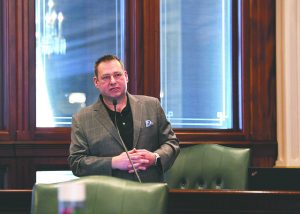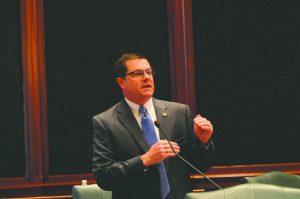House bill would start college savings accounts for all newborns in Illinois
By Peter Hancock Capitol News Illinois — April 8, 2019SPRINGFIELD — Despite vocal opposition from Republicans, the Illinois House passed a bill Wednesday that would automatically deposit $50 into a college savings account for every child born or adopted in Illinois, starting in January 2021.
The idea, according to Rep. Robyn Gabel, an Evanston Democrat and chief sponsor of the bill, is to increase educational attainment in future generations of Illinoisans
“The importance of this bill is that research has shown that any amount that is saved for a child for higher education, they will be three times more likely to attend college, and four times more likely to graduate from college,” Gabel said in arguing for the bill.
Among the studies that have linked small-dollar savings accounts to higher college attendance rates was one conducted in 2013 at the Center on Assets, Education and Inclusion at the University of Michigan. It found there especially strong correlations between having a savings account and ultimate college attendance among black children and children from low- and moderate-income households.
The bill calls for establishing a new Higher Education Savings Program within the state treasurer’s office. It would set up what are known as 529 accounts, named after a section of the federal tax code that provides for tax-sheltered college savings accounts, for any child born in Illinois or adopted by an Illinois family starting Jan. 1, 2021.

State Rep. Allen Skillicorn, R-East Dundee (File photo credit: Illinois House of Representatives staff)
Based on the state’s average of 155,000 to 165,000 births per year, state officials estimate it would cost about $8 million a year to fund, plus another $1.5 million or so in administrative costs.
High school graduates would have access to that money, plus any interest and dividends it earns over time, until they are 26. Families would also be encouraged to contribute additional money or set up their own separate 529 accounts.
But if the student does not go on to any form of post-secondary education, he or she would forfeit the original $50, plus earnings associated with it, and those funds would be used to pay for other children’s accounts in the future.
Rep. Grant Wehrli, a Naperville Republican, cited the administrative costs as a reason to oppose the bill, comparing them to the fees, or “loads” that investment firms charge for the purchase of mutual funds.
“That’s over 10 percent in operational costs,” he said. “If you’re an investor in a mutual fund, if you have a 10 percent load, you’re being ripped off.”
Rep. Allen Skillicorn, a Republican from East Dundee, said the bill would do nothing for blue-collar, working-class students who go into the workforce straight out of high school without pursuing a college education.
“This favors families that can send their kids to college,” he said. “It doesn’t do anything for blue-collar workers. It doesn’t do anything for impoverished communities. This is more welfare for the rich.”
Other Republicans questioned why the program would be set up in the state treasurer’s office.
“I think it’s a way for the treasurer to get his name out, no matter who the treasurer is,” Rep. C.D. Davidsmeyer, a Jacksonville Republican, said.
Democrats, meanwhile, defended the bill, saying it would result in more Illinois high school graduates going on to college.
“This is a very simple proposal that is grounded in research that says we can create better outcomes for our children with a very small up-front investment from our state,” Rep. Will Guzzardi, a Chicago Democrat, said. “We’re telling our children that we believe in their future.”
The bill, House Bill 2237, passed by a vote of 66-42. It now moves to the Senate for consideration.
phancock@capitolnewsillinois.com









